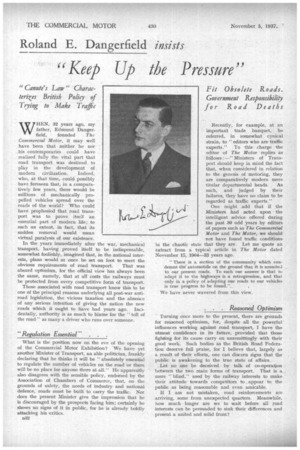Roland E. Dangerfield insists
Page 8

If you've noticed an error in this article please click here to report it so we can fix it.
"Keep Up the Pressure" " Canute's Law" Characterkes British Policy of Trying to Make Traffic
HEN, 32 years ago, my father, Edmund Danger
field, founded The Commercial Motor, it may well have been that neither he nor .his contemporaries could have realized fully the vital part that road transport was destined to pray in the development of modern civilization. Indeed, who, at that time, could possibly have foreseen that, in a comparatively few years, there would be millions of mechanically propelled vehicles spread over the roads of the world? Who could have prophesied that road transport was to prove itself an essential part of modern life; to such an extent, in fact, that its sudden removal would mean virtual paralysis of our existence.
In the years immediately after the war, mechanical transport, having proved itself to be indispensable, somewhat foolishly, imagined that, in the national interests, plans would at once be set on foot to meet the obvious requirements of road transport. That was absurd optimism, for the official view has always been the same, namely, that at all costs the railways must be protected from every competitive form of transport.
Those associated with road transport know this to be one of the principal reasons underlying all post-war antiroad legislation, the vicious taxation and the absence of any serious intention of giving the nation the new roads which it ought to have had years ago. Incidentally, authority is as much to blame for the "toll of the road" as many a driver who runs over someone.
"Regulation Essential"
What is the position now on the eve of the opening of the Commercial Motor *Exhibition? We have yet another Minister of Transport, an able politician, frankly declaring that he thinks it will be "absolutely essential to regulate the number of vehicles on the road or there will be no place for anyone there at all." He apparently also disagrees with the sensible policy, endorsed by the Association of Chambers of Commerce, that, on the grounds of safety, the needs of industry and national defence, roads must be built to carry the traffic. Nor does the present Minister give the impression that he is discouraged by the prospects facing him; certainly he shows no signs of it in public, for he is already boldly attacking his critics.
D32
Recently, for example, at an important trade banquet, he referred, in somewhat cynical strain, to "editors who are traffic experts." To this charge the editor of The Motor replies as follows :—" Ministers of Transport should keep in mind the fact that, when considered in relation to the genesis of motoring, they are comparatively modern mere
titular departmental heads. As such, and judged by their failures, they have no claim to be regarded as traffic experts."
One might add that if the Ministers had acted upon the intelligent advice offered during the past 30 odd years by editors of papers such as The Commercial Motor and The Motor, we should not have found traffic conditions in the chaotic state that they are. Let me quote an extract from a typical article in The Motor dated November 15, 1904 33 years ago.
" There is a section of the community which condemns tile' automobile on the ground that it is unsuited to our present roads. To such our answer is that to adapt it to the highways is a retrogression, and that only in a policy of adapting our roads to our vehicles is true progress to he found."
We have never wavered from this view.
. . Reasoned Optimism
Turning once more to the present, there are grounds for reasoned optimism, for, despite all the powerful influences working against road transport, I have the utmost confidence in its future, provided that those fighting for its cause carry on unremittingly with their good work. Such bodies as the British Road Federation deserve full praise, for I believe that, largely as a result of their efforts, one can discern signs that the public is awakening to the true state of affairs.
Let no one be deceived by talk of co-operation between the two main forms of transport. That is a mere "blind," used by the railway interests to make their attitude towards competitors to . appear to the public as being reasonable and even amicable.
If I am not mistaken, road reinforcements are arriving, some from unexpected quarters. Meanwhile, how much longer are we to wait before all road interests can be persuaded to sink their differences and present a united and solid front?


















































































